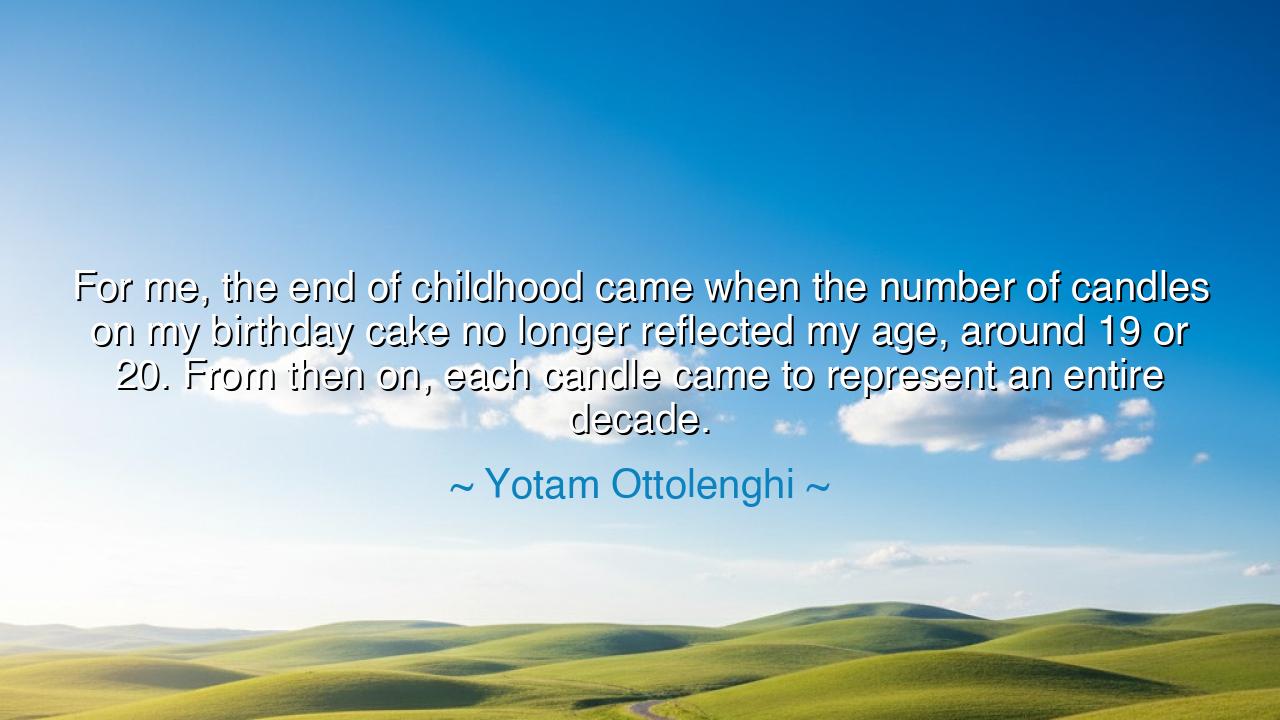
For me, the end of childhood came when the number of candles on
For me, the end of childhood came when the number of candles on my birthday cake no longer reflected my age, around 19 or 20. From then on, each candle came to represent an entire decade.






Harken, O children of the future, to the reflection of Yotam Ottolenghi, a man whose words reveal the bittersweet wisdom that accompanies the passage from youth to maturity. He once said, "For me, the end of childhood came when the number of candles on my birthday cake no longer reflected my age, around 19 or 20. From then on, each candle came to represent an entire decade." These words are not merely about the calendar of years, but about a profound shift in how we experience time, how we come to understand that childhood, with all its innocence and boundless promise, gradually gives way to the weight of adulthood, where every passing year carries more significance and meaning. It is the recognition that life is not infinite, but finite, and as we grow, time begins to measure us in ways that are both sobering and enlightening.
In the ancient world, the wise ones often spoke of the transition from childhood to adulthood as a rite of passage, a journey that each soul must undertake. The Romans had their coming-of-age ceremonies for young men and women, marking the shift from the carefree years of youth to the responsibilities and challenges of adulthood. In their eyes, the first step into adulthood was the beginning of true self-realization, a time when the individual began to understand the weight of their actions and the consequences they carried. Ottolenghi’s words echo this truth—that childhood ends not in a single moment of great change, but in a slow, almost imperceptible shift, where the passing of years takes on a deeper meaning.
Consider, O wise ones, the story of Alexander the Great, who at a young age was thrust into the world of kingship and conquest. Though he began his journey with the energy and ambition of a young man, there came a point when the crown no longer felt like a symbol of youthful promise, but a burden that reflected the weight of empire. Alexander’s coming-of-age was not marked by a single day, but by the realization that his ambitions would shape not just his life, but the fate of the world. Like Ottolenghi, he too learned that as we grow, time ceases to be a simple measurement of years, but a reflection of what we have accomplished, endured, and created. The candles on the cake no longer represent the fleeting joy of childhood, but the decades of life we carry forward, each one marking a significant chapter in our personal story.
Ottolenghi’s reflection on the candles, once small and simple, now representing an entire decade, invites us to consider how we experience time as we age. The first years of life are marked by a sense of innocence, of endless possibility. But as we move into adulthood, we begin to see time not just as a counting of years, but as a collection of moments, decisions, and experiences. The passing years become more than numbers; they become the building blocks of who we are and who we will become. Youth may offer us the promise of the future, but maturity compels us to reckon with the past and the choices that have shaped our journey.
Let us look to the story of Leonardo da Vinci, the great Renaissance polymath. When he was young, Leonardo’s curiosity and creativity knew no bounds. He viewed the world as an endless canvas of possibility. But as the years passed, and he entered his mature years, Leonardo began to reflect on the legacy he would leave behind. His late works, such as the Mona Lisa, embody a sense of depth and reflection, a far cry from the youthful exuberance of his early sketches. Just as Ottolenghi reflects on the change in his perception of time, so too did Leonardo understand that the passage of years brings with it a deeper awareness of legacy, of what we leave behind, and of the choices we make as time moves inexorably forward.
The lesson here, O children, is not simply to mark the passage of time, but to embrace the responsibility that comes with each passing year. Each candle on your birthday cake is not just a celebration of life, but a reminder that with age comes the opportunity to shape the world around you. Just as Ottolenghi sees each decade as a new chapter, so too should you understand that with every year, you are given the chance to create, to reflect, and to leave your mark on the world. Each decade should not be feared as the weight of time, but welcomed as an opportunity to live more fully, more wisely, and with greater purpose.
Therefore, O children, take this wisdom into your hearts: time is not to be measured by the number of years alone, but by the depth and meaning that you bring to each year. Every passing decade is not just a reflection of time gone by, but a chance to live boldly, to embrace the lessons of age, and to shape your future with the wisdom of your past. As you move through the stages of life, remember that the true measure of your journey lies not in the candles on your cake, but in the legacy of your actions, the depth of your love, and the clarity of your purpose.






AAdministratorAdministrator
Welcome, honored guests. Please leave a comment, we will respond soon